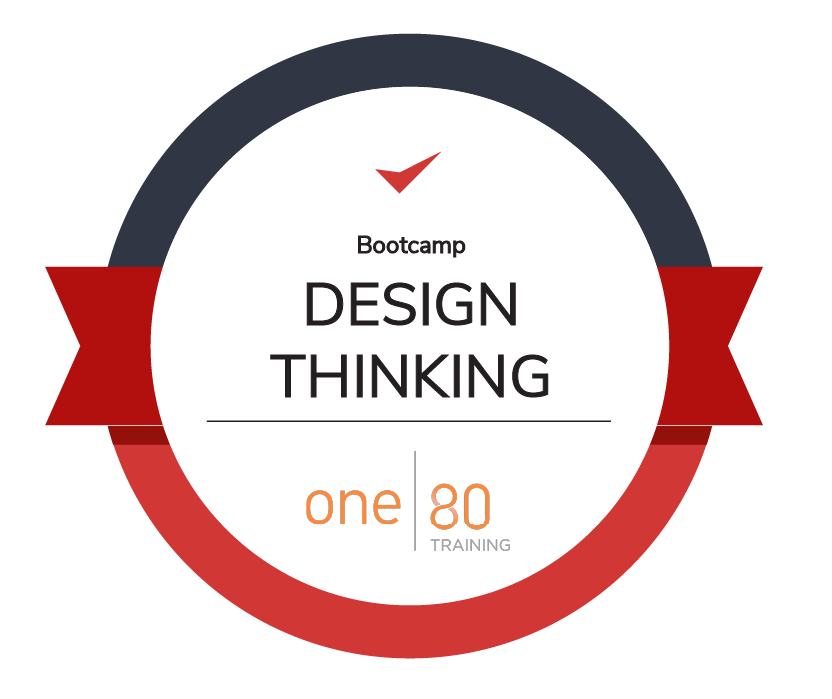Design Thinking Bootcamp
Why Design Thinking
Design Thinking is more than a methodology—it’s a transformative approach that drives real-world impact by fostering creativity and collaboration. Design Thinking empowers organizations to solve complex problems effectively by emphasizing empathy, experimentation, and user-centered innovation.
Research by McKinsey & Company reveals that companies excelling in Design Thinking achieve 32% higher revenue growth and 56% greater shareholder returns than their peers. Additionally, the Design Management Institute found that design-led companies outperformed the S&P 500 by 219% over a decade.
Design Thinking enables teams to:
- Uncover latent user needs through deep empathy and research.
- Reduce development costs by 50% through early prototyping and testing, according to Stanford University studies.
- Increase team productivity and alignment by over 35%, fostering a culture of innovation and collaboration.
In today’s fast-paced, user-driven markets, organizations that leverage Design Thinking are not just surviving—they’re thriving. This bootcamp offers a practical, immersive path to harnessing design thinking's transformative potential for real-world results.
• McKinsey & Company: The statistic that companies excelling in Design Thinking achieve 32% higher
revenue growth and
56% greater shareholder returns is derived from McKinsey's report titled "The Business Value of
Design" (2018). This
comprehensive study analyzed 300 publicly listed companies and found that organizations with strong
design practices
outperformed industry benchmarks significantly.
• Design Management Institute (DMI): The 219% outperformance of design-led companies over the S&P
500 is based on the
DMI Design Value Index report. This study tracked the performance of publicly traded companies
recognized for their
strong design orientation, including Apple, Coca-Cola, and Nike, from 2003 to 2013. It demonstrated
the financial
advantages of embedding design principles into business strategy.

Description
Take your understanding of Design Thinking beyond the classroom with our Design Thinking Bootcamp—a five-week immersive experience that combines theory and hands-on application. This unique course is designed for professionals who want to apply Design Thinking principles to real-world projects while collaborating with peers.
You’ll join a cohort of 2–3 participants and select a real product or project to tackle. Each week begins with a live training session to explore key Design Thinking concepts, followed by cohort collaboration to implement lessons learned. Instructors will hold dedicated office hours for personalized guidance, ensuring that your project stays on track and aligns with the Design Thinking framework.
By the end of the Bootcamp, your cohort will present a polished proposal to stakeholders, showcasing the experiments you conducted, the results achieved, and innovative ideas for the future. This is more than a class—it’s a dynamic opportunity to learn by doing and create tangible value for your organization.
Objectives
- Master Practical Design Thinking Skills: Apply Design Thinking principles to real-world projects, focusing on innovation and user-centric solutions.
- Collaborate Effectively in Cohorts: Develop teamwork skills by working in small groups to address complex challenges and deliver impactful results.
- Understand the Design Thinking Phases: Confidently navigate the Discovery, Define, Ideate, Prototype, and Test phases.
- Conduct Meaningful User Research: Use advanced tools, such as empathy maps, contextual inquiries, and journey mapping, to uncover deep insights.
- Run Experiments and Analyze Results: Prototype solutions, test assumptions, and iterate based on real user feedback.
- Create Engaging Stakeholder Presentations: Develop and deliver persuasive presentations highlighting your insights, achievements, and creative recommendations.
- Bridge Theory and Practice: Acquire practical experience in applying Design Thinking, ensuring long-term retention and utilization of essential concepts.
Design Thinking Bootcamp Sample Schedule
| Week | Objectives |
|---|---|
| Week 1: |
|
| Week 2: |
|
| Week 3: |
|
| Week 4: |
|
| Week 5: Presentations |
|
Who Should Attend
- Designers and Creative Professionals: UX/UI Designers, Graphic Designers, and Industrial Designers aiming to enhance their human-centered design approach.
- Product Managers and Product Owners: Professionals responsible for product strategy and development looking to incorporate user feedback and iterative testing into their workflows.
- Business Leaders and Executives: Leaders driving innovation initiatives or organizational change who want to adopt a structured framework for problem-solving.
- Innovation and Strategy Managers: Professionals in charge of driving innovative solutions, enhancing customer experiences, and staying ahead in competitive markets.
- Engineers and Developers: Team members who build solutions and want to align technical capabilities with user needs and business objectives.
- Project Managers Professionals managing cross-functional teams who need frameworks to enhance collaboration and align efforts with customer value.
- Consultants and Coaches:Agile Coaches, Change Agents, and Business Consultants looking to expand their toolkit with Design Thinking methodologies.
- Students and Career Changers:Individuals transitioning into roles where innovation, creativity, and problem-solving are critical.
